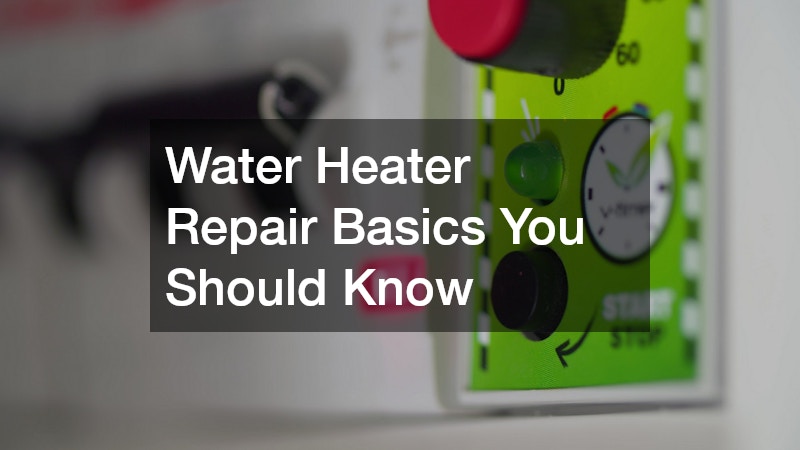
Water Heater Repair Basics You Should Know
In this article, we will explore fundamental concepts related to water heater repair, ensuring you are equipped with the knowledge to tackle common issues effectively. Understanding how your water heater operates can make it much easier to identify problems. Additionally, being informed about maintenance and when to call for professional help can save you time and resources in the long run.
What Are the Signs That Your Water Heater Needs Repair?
Understanding the common indicators of water heater issues can help prevent further damage and ensure your system runs efficiently. Common signs that your water heater may need repair include strange noises, water discoloration, and inconsistent water temperatures.
Being aware of these indicators early on can help you address issues before they escalate into major problems.
Strange noises can be a signal that sediment has built up in the tank, leading to reduced efficiency and potential damage. If you notice your water heater making popping or rumbling sounds, it may indicate that it’s time for a flush or further investigation. Ignoring these sounds could result in much more significant problems down the line.
Discolored water is another critical sign that your water heater may require attention. Water that appears rusty or has a strange odor can point to corrosion inside the tank or issues with your home’s plumbing system. Regular checks can help you spot these signs early and take necessary action, ensuring fresh, clean water for your household.
How to Troubleshoot Common Water Heater Problems?
Troubleshooting your water heater can save you time and money. Learning the basic steps to identify and rectify common malfunctions can empower you to handle issues without immediately calling for professional help. Begin by checking the thermostat setting; sometimes, the solution is as simple as adjusting the temperature. Ensure that it’s set to the desired level for optimal heating.
If the water is not getting hot, you may also want to examine the power source. For electric water heaters, ensure that the circuit breaker hasn’t tripped or fuses haven’t blown. A quick inspection can sometimes identify the root cause of the problem, saving you a potentially costly service visit.
For gas water heaters, check if the pilot light is on. If it’s out, it will need to be relit according to the manufacturer’s instructions. Failing to do so can leave you without hot water, and in some cases, it can also create a safety hazard if gas builds up. Following proper troubleshooting steps can often lead you to the solution without requiring professional intervention.
When Should You Consider Professional Water Heater Repair?
Sometimes, the best course of action is to call a professional. Knowing when to seek help can prevent complications and ensure safety. One clear sign that you need a professional is when repairs become too complex or you’re unable to resolve the issue on your own. It’s important to recognize your limits to ensure that problems don’t worsen.
If you have tried various troubleshooting methods and your water heater is still not functioning properly or you’re experiencing recurrent issues, it may be time to contact a licensed technician. Professionals have the experience and tools to address a range of issues, including those that may not be obvious to the average homeowner. Their expertise can ensure that repairs are completed safely and efficiently.
Additionally, if you detect a gas leak or strong smells coming from your water heater, you should evacuate the area and contact a professional immediately. Gas leaks can pose serious dangers, including explosions, and should be treated with urgency. Professional help is essential in these situations to secure the safety of your home and loved ones.
How to Maintain Your Water Heater for Longevity?
Regular maintenance can extend the life of your water heater. Here are essential tips to keep your unit functioning optimally. Start with routine flushing of the tank to remove sediment build-up, which can influence efficiency and the lifespan of the unit. Depending on your water quality, consider flushing your water heater every six months to a year.
Also, inspect the anode rod, typically found inside the tank, at least once a year. This rod helps prevent corrosion and determines how long your heater will last. If it is more than 50% corroded, it should be replaced to maintain the tank’s integrity and performance. Regular checks and replacements of this vital component can lead to significant savings by prolonging the need for a full heater replacement.
Lastly, check the temperature settings and pressure relief valves. Ensuring the thermostat is set correctly prevents overheating and excessive pressure, which can lead to leaks or even explosions. Developing a maintenance routine and keeping detailed records can lead to a well-functioning water heater, providing you with reliable hot water for years to come.
By understanding these water heater repair basics, you can approach repairs and maintenance with confidence, ensuring a consistent supply of hot water in your home. Taking the time to familiarize yourself with your unit can save you both time and money. Remember that while troubleshooting is often effective, recognizing when to call in professionals is crucial for safety and the longevity of your appliance.

